
| Centre Name: | 
Centre for Cybersecurity (CCS) (http://ccs.research.utar.edu.my/) |
| Chairperson: | Dr. Denis Wong Chee Keong |
| Description of Centre: | Centre for Cyber Security (CCS) was found by Lee Kong Chian Faculty of Engineering and Science (LKCFES), Universiti Tunku Abdul Rahman (UTAR) in January 2016. This centre aims to attract significant external research grants and encourage multidisciplinary collaborations. Besides, CCS was formed to demonstrate national leadership and international recognition for excellence in the area of cyber security. The goal of CCS is to become a recognized centre of excellence for the field of cyber security internationally. To promote and lead research and development, technology transfer and training of experts in the area related to cyber security to enhance competitiveness of local industries in global market through the collaborations among the members and external parties |
| Research area: |
|
| No. | Name | Faculty | Member |
|---|---|---|---|
| 1 | Ir. Prof. Dr. Goi Bok Min | LKCFES | Full Membership |
| 2 | Dr. Yap Wun She | LKCFES | Full Membership |
| 3 | Mr. Chai Tong Yuen | LKCFES | Full Membership |
| 4 | Ms. Wong Kuan Wai | LKCFES | Full Membership |
| 5 | Dr. Tee Yee Kai | LKCFES | Associate Membership |
| 6 | Mr. Chong Kah Meng | LKCFES | Associate Membership |
| 7 | Dr. Sim Hong Seng | LKCFES | Associate Membership |
| 8 | Dr. Qua Kiat Tat | LKCFES | Associate Membership |
| No. | Date | Event |
|---|---|---|
| 1 | 23 October 2020 | Webinar to promote blockchain and cryptographic primitive application |
| 2 | 30 October 2020 | Webinar to discuss blockchain technology and its application |
| 3 | 15 December 2020 | Webinar on Data Hiding in Nontraditional Content |
| No. | Activity | |
|---|---|---|
| 1 | Webinar to Promote Blockchain and Cryptographic Primitive Application
Blockchain, an emerging technology based on a distributed computing system and cryptography, is driving the 4th Industrial Revolution (IR) and Internet of Things (IoT) with increasing impact on cyber security, insurance, banking, data and financial analytics. The Centre for Curriculum Development and Innovation (CCDI) organised a webinar titled “Cryptography: Core Technology of Blockchain” on 23 October 2020. It was held via Zoom for academics and members of the public to understand the blockchain and its function. The webinar, which saw more than 100 participants, was presented by UTAR Lee Kong Chian Faculty of Engineering and Science (LKC FES) Head of Programme for Master of Mathematics Dr Denis Wong Chee Keong who presented the use of blockchain technology for insurance underwriting process as a case study, cryptographic primitives and the curriculum design. The webinar was moderated by LCK FES Prof Dr Chia Gek Ling. Furthermore, Dr Denis Wong shared his experience in drawing linkage of mathematics to blockchain technology into selected Year 2 and Year 3 Department of Mathematical and Actuarial Sciences (DMAS) courses. The exposure of students to these theory-based courses have led to Final Year Project research in relation to IR4.0, IoT, cyber security, insurance, banking, data and financial analytics. Dr Denis Wong also spoke about the history of blockchain, advantage and disadvantage, zero-knowledge identification protocol and other related topics. “Cryptography is a branch of mathematics to study the internal structure of different types of schemes and primitive. Blockchain is almost inseparable with cryptography because there are a lot of cryptography primitives used in blockchain. A blockchain is a distributed ledger with an append-only data structure to store a continuously growing list of transaction; the blockchain is replicated and maintained among the members of the network. Some of the unique properties of blockchain include decentralisation and the members in blockchain have equal rights, thus making it transparent. Blockchain has the properties of unforgeability and resists double spending as well as immutability whereby the data stored in the blockchain cannot be modified. Some of the main components in a blockchain include cryptographic hash, timestamp and transaction data. Cryptographic primitive is one of the most important components in a blockchain. Blockchain has its own limitation and it has limited storage capacity. It might store sensitive data which may be accessed by an unauthorised user,” Dr Denis Wong explained. He later spoke about Combinatorial Design and Finite Group Theory which is currently offered in the Applied Mathematics with Computing programme that studies different types of block design. “A block design is a set of the family of subsets which are chosen to satisfy some properties. One of the block designs which receives a lot of attention is the Balanced Incomplete Block Designs (BIBD) which is used in the statistical issues in the experimental designs. The objective to combine few disciplines and ideas from algebra and combinatory to investigate multiple open problems in Post Quantum Cryptography,” said Dr Denis Wong. The session was followed by a Q&A session between the speaker and participants. Dr Denis Wong Chee Keong received his B.Sc. and M.Sc. degrees in Mathematics and PhD degree in Algebraic Coding Theory from Universiti Sains Malaysia (USM). His research interests include algebraic coding theory, algebraic combinatorics and cryptography. |
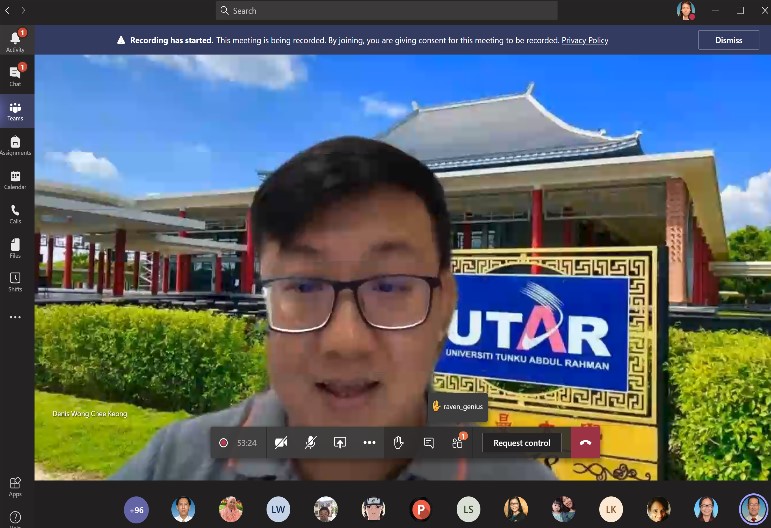
Figure 1: Reverse cipher source code 
Figure 2: Reverse cipher source code 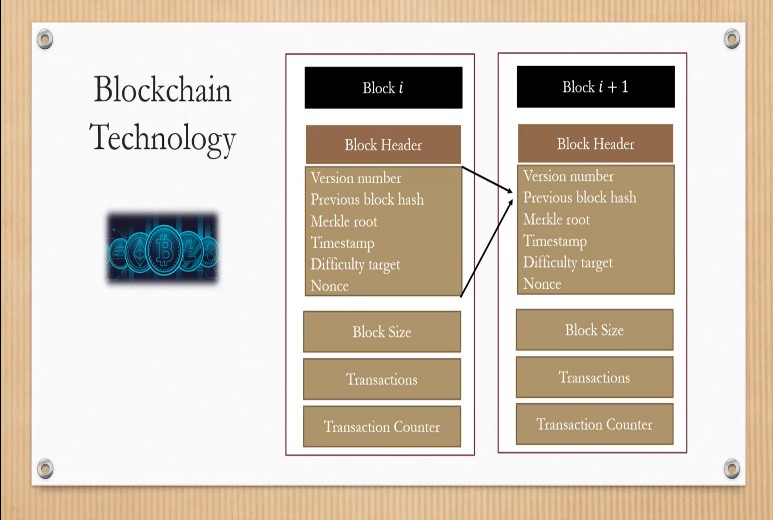
Figure 3: Game of sim illustration |
| 2 | Webinar to Discuss Blockchain Technology and its Application
Blockchain is an emerging application based on distributed computing and cryptography. Bitcoin is one of the most well-known applications of blockchain technology which revolutionised the development of crypto-currency. Blockchain 2.0 has impacted various industries including finance (FinTech), manufacturing, insurance and renewable energy (SolarCoin). Thus, to enlighten the academics of UTAR and the members of the public on blockchain technology as well as its development and applications, the Centre for Curriculum Development and Innovation (CCDI) organised a webinar titled “Introduction to Blockchain Technology and Overview of its Applications” on 30 October 2020 via Microsoft Teams. The speaker for the sharing session was Gachon University, South Korea researcher Dr Lee Wai Kong. He has vast experience in R&D as a reviewer for various international journals such as Institute of Electrical and Electronics Engineers (IEEE) Transactions on Dependable and Secure Computing (2016 & 2017), IEEE Sensors, IEEE Internet of Things Journal (2018-2020) and IEEE Transactions on Industrials Informatics (2018-2020). During the session, Dr Lee presented the introduction of blockchain, motivations for blockchain, introduction to secret and public key cryptography, the historical development of blockchains from blockchain 1.0: the infamous bitcoin, blockchain 2.0: smart contracts and blockchain 3.0: interconnected blockchain, case study, Internet of Things (IoT), energy harvesting and future prospects for blockchain. The webinar was moderated by Head of Computer Science Department Ts Dr Ooi Boon Yaik. |
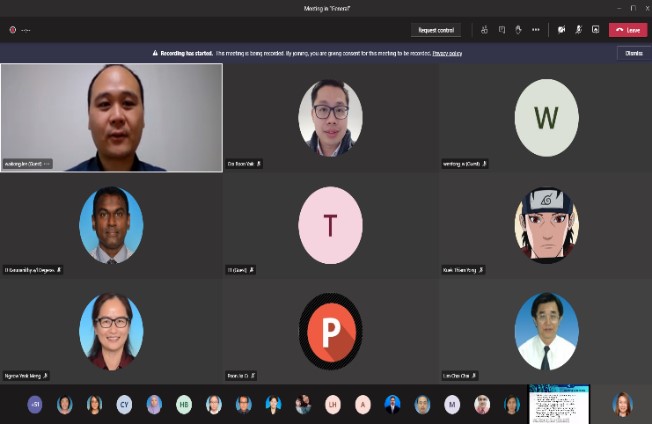
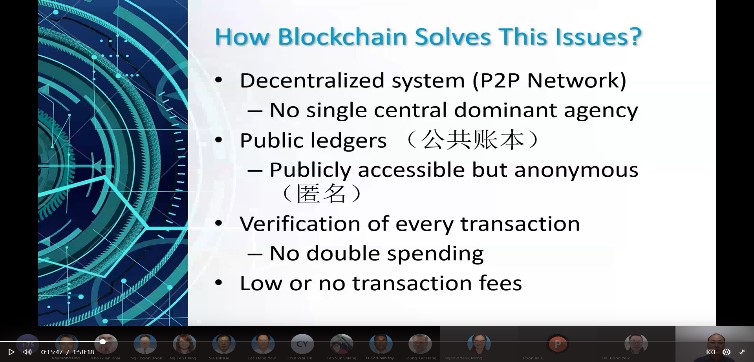
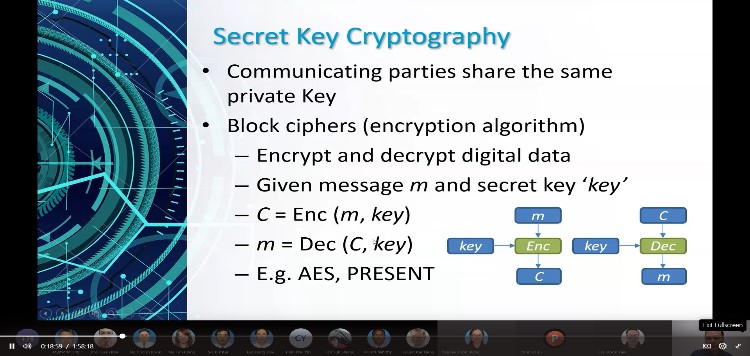
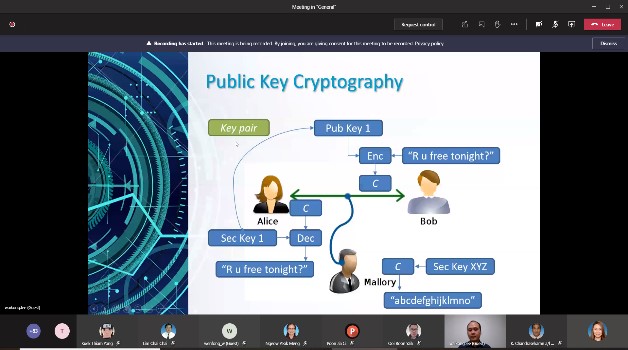
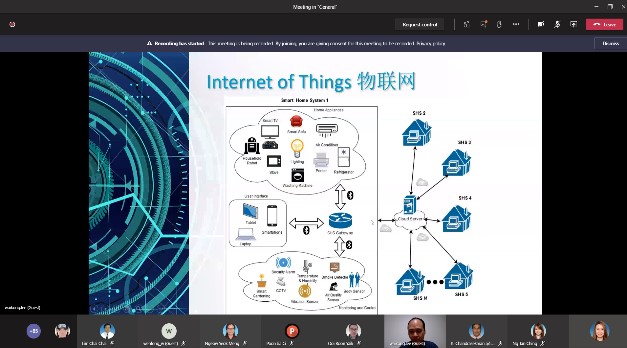
|
| 3 | Webinar on Data Hiding in Nontraditional Content
The speaker for the sharing session was Dr. Wong Kok Sheikh from Monash University, Malaysia. The talk is on 15 December 2020 and during the talk, Dr. Wong shared many of his research ideas on data hiding in Nontraditional content, the talk is attended by around 30 students and staffs from UTAR. |


|